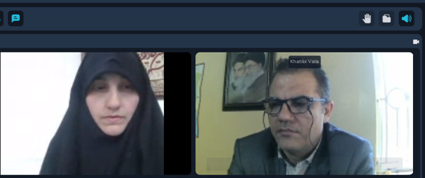REPORT - WEBINAR ON THE STATUS OF WOMEN IN THE HOLY QURAN AND OTHER RELIGIONS
The Cultural Council Embassy of the Islamic Republic of Iran in Nairobi, in collaboration with the Department of Philosophy and Religious Studies at the University of Nairobi, organized a webinar titled "Exploring Women's Status in the Holy Quran and Other Religions."

The Cultural Council Embassy of the Islamic Republic of Iran in Nairobi, in collaboration with the Department of Philosophy and Religious Studies at the University of Nairobi, organized a webinar titled "Exploring Women's Status in the Holy Quran and Other Religions."
This enlightening event was held on Sunday, May 28, 2023, from 10:00 am to 12:00 Noon, utilizing the Skyroom conferencing platform. Distinguished speakers from both the University of Nairobi and Iranian universities shared their expertise on various aspects related to women's roles and rights.
The opening remarks were delivered by Mr. Mohammedreza Khatibi Vala, Cultural Counsellor at the Embassy of the Islamic Republic of Iran in Nairobi. Prof. Karori Mbugua, Chair of the Department of Philosophy and Religious Studies at the University of Nairobi, provided the closing remarks. The interpretation services were expertly conducted by Sh. Ali Mwega, and the moderation of the event was skillfully handled by Dr. Zainab Salami.
The Kenyan lineup of speakers included:
- Dr. Hassan Kinyua - Topic: "Islam and Women's Rights" Dr. Kinyua delved into the topic of women's rights within the context of Islam, shedding light on the principles and teachings that shape their status in the religion.
- Dr. Telesia K. Musili & Fancy Cherono - Topic: "Sexual Reproductive Health and Rights: Women's Inclusion in Socio-Economic Participation in the Public Sphere" Dr. Musili and Ms. Cherono focused on the crucial intersection of sexual reproductive health and women's socio-economic participation, emphasizing the importance of ensuring equal opportunities for women in the public sphere.
- Dr. Edith Kayeli - Topic: "Religion, Gender, and Climate Change" Dr. Kayeli explored the dynamic relationship between religion, gender, and climate change, highlighting the need for gender-inclusive approaches in addressing environmental challenges.
In addition to these esteemed speakers, two scholars from Iranian universities shared their valuable insights:
- Dr. Fareshte Rohafza - Topic: "The Chosen Women in the Holy Quran". Dr. Rohafza examined the concept of chosen women as depicted in the Holy Quran, providing a comprehensive understanding of their significance and representation within Islamic scriptures.
- Dr. Zahra Salami - Topic: "Socializing in a Famous Way with a Look at the Position of Women in the Qur'an" Dr. Salami offered a unique perspective on women's position in the Qur'an by exploring the social interactions and relationships depicted in the religious text.
Through this collaborative webinar, the Cultural Council of the Embassy of the Islamic Republic of Iran and the Department of Philosophy and Religious Studies at the University of Nairobi aimed to foster dialogue, promote understanding, and deepen knowledge about the status of women in the Holy Quran and other religions.
The Conference commenced with an opening statement delivered by Mr. Mohammed Reza Khatibi Vala, the Cultural Counsellor at the Embassy of the Islamic Republic of Iran in Nairobi.

In his introductory remarks, the Cultural Counsellor warmly welcomed all the participants to the webinar and expressed gratitude for the continued cooperation between the Cultural Council and the University of Nairobi.
He particularly expressed his delight at the swift organization of this webinar on the status of women in the Holy Quran and other religions, jointly hosted by the Cultural Council of Iran and the Department of Philosophy and Religious Studies at the University of Nairobi.
Mr. Khatibi stated, "Today, we have gathered here to delve into the profound teachings of various religions, with a special emphasis on the Holy Quran, concerning the role and status of women. Through this webinar, we aim to explore the texts, interpretations, and traditions of different religions, shedding light on their perspectives on women and their invaluable contributions to society."
He emphasized the significance of acknowledging the potential variations in the interpretations of religious texts, as well as the influence of cultural and societal norms on the perception of women's roles. Mr. Khatibi stressed the importance of engaging in an open, respectful, and inclusive dialogue that encourages critical thinking, challenges stereotypes, and fosters positive change.
In conclusion, the Cultural Counsellor highlighted that the webinar presents a unique opportunity to examine the status of women in the Holy Quran and other religions. By studying the scriptures, traditions, and interpretations, the goal is to cultivate a deeper understanding of the principles that guide the treatment and empowerment of women within religious contexts.
He encouraged everyone to seize this moment to promote dialogue, bridge differences, and work towards a more inclusive and equitable future. Mr. Khatibi concluded his remarks by stating, "May our discussions today inspire us to create a world where women's rights and dignity are upheld, irrespective of their religious backgrounds."







Write your comment.